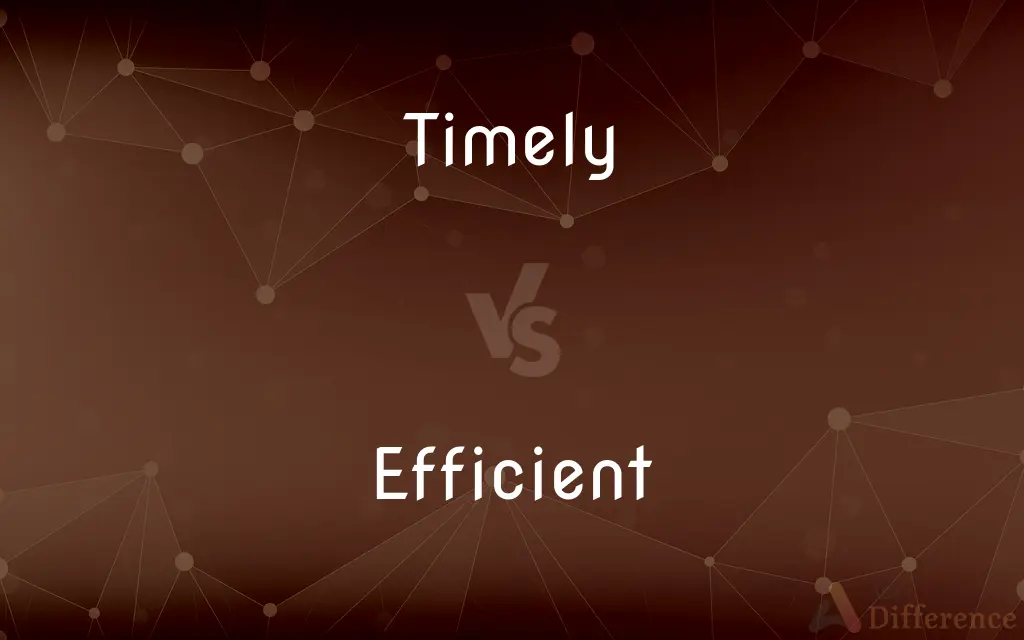Timely vs. Efficient — What's the Difference?
By Tayyaba Rehman & Fiza Rafique — Updated on March 26, 2024
Timely means occurring at a favorable or appropriate time, while efficient refers to achieving maximum productivity with minimum wasted effort or expense.

Difference Between Timely and Efficient
Table of Contents
ADVERTISEMENT
Key Differences
Timely actions or decisions are characterized by their occurrence at the most suitable moment, which can significantly impact the outcome or effectiveness of an endeavor. On the other hand, efficiency focuses on the method of achieving goals, emphasizing the importance of using resources, including time, in the most productive way possible without unnecessary waste.
While being timely emphasizes the "when" aspect of actions, ensuring that they align with opportune moments, efficiency is more concerned with the "how," aiming to accomplish tasks or goals in the most effective manner. This distinction highlights the temporal focus of timeliness versus the methodological focus of efficiency.
Timeliness is often associated with responsiveness and the ability to act quickly or at the right moment to take advantage of opportunities or avoid problems. Whereas, efficiency is related to optimization, striving to achieve the best possible results with the least amount of resources, including time, labor, and materials.
In some contexts, timeliness can contribute to efficiency, as taking action at the right time can reduce the need for additional efforts or resources later. Conversely, prioritizing efficiency can sometimes lead to delays, as finding the most resource-effective approach might require more upfront time and planning.
While both timeliness and efficiency are valuable qualities in many contexts, they serve different purposes. Timeliness focuses on aligning actions with the most appropriate times, while efficiency is about maximizing productivity and minimizing waste in the process of achieving goals.
ADVERTISEMENT
Comparison Chart
Focus
Occurrence at a suitable or opportune time
Maximizing productivity with minimal waste
Primary Concern
When an action takes place
How an action is carried out
Related to
Responsiveness, punctuality
Optimization, resourcefulness
Impact on Outcomes
Can seize opportunities or prevent issues
Ensures goals are met with minimal resources
Relationship
Can enhance efficiency in certain contexts
Focus on efficiency may delay timely actions
Compare with Definitions
Timely
Occurring at a favorable moment.
A timely intervention saved the project.
Efficient
Capable of producing desired results without excess.
Efficient appliances reduce electricity consumption.
Timely
Well-timed and opportune.
His timely advice proved invaluable.
Efficient
Utilizing resources wisely.
Efficient use of time allowed him to complete two projects simultaneously.
Timely
Synchronous with current events.
The article was timely, addressing the recent policy changes.
Efficient
Achieving maximum output with minimum input.
An efficient process saved the company time and money.
Timely
Punctual, without delay.
Her timely arrival ensured the meeting started on schedule.
Efficient
Functioning effectively without waste.
The new software is more efficient than the old system.
Timely
Appropriate to the time or season.
The store's timely sale capitalized on holiday shopping trends.
Efficient
Productive, not wasting time or resources.
Her efficient planning made the event a success.
Timely
Occurring at a suitable or opportune time; well-timed.
Efficient
(of a system or machine) achieving maximum productivity with minimum wasted effort or expense
More efficient processing of information
Timely
In time; opportunely.
Efficient
(of a person) working in a well-organized and competent way
An efficient administrator
Timely
Done at the proper time or within the proper time limits; prompt.
Efficient
Acting or producing effectively with a minimum of waste, expense, or unnecessary effort
An efficient builder.
An efficient factory.
Timely
Happening or appearing at the proper time.
Efficient
Acting directly to produce an effect
The efficient cause of the revolution.
Timely
(obsolete) Keeping time or measure.
Efficient
Causing less waste or requiring less effort than comparable devices or methods. Used in combination
Energy-efficient wind turbines.
Cost-efficient health care.
Timely
(archaic) In good time; early, quickly.
Efficient
Making good, thorough, or careful use of resources; not consuming extra. Especially, making good use of time or energy
An efficient process would automate all the routine work.
Our cleaners are almost too efficient: they throw away anything left out on a desk.
Timely
(obsolete) At the right time; seasonably.
Efficient
Expressing the proportion of consumed energy that was successfully used in a process; the ratio of useful output to total input
The motor is only 20% efficient at that temperature.
Timely
(legal) In compliance with applicable time limits.
Efficient
Causing effects, producing results; bringing into being; initiating change (rare except in philosophical and legal expression efficient cause = causative factor or agent)
Ownership, maintenance, or use of the automobile need not be the direct and efficient cause of the injury sustained
Timely
Being or occurring in good time; sufficiently early; seasonable.
Efficient
Effective, efficacious
Timely
Keeping time or measure.
Efficient
(obsolete) a cause; something that causes an effect
Timely
Early; soon; in good season.
Timely advised, the coming evil shun.
Thanks to you,That called me timelier than my purpose hither,For I have gained by it.
Efficient
Causing effects; producing results; that makes the effect to be what it is; actively operative; not inactive, slack, or incapable; characterized by energetic and useful activity; as, an efficient officer, power.
The efficient cause is the working cause.
Timely
Before a time limit expires;
The timely filing of his income tax return
Efficient
An efficient cause; a prime mover.
God . . . moveth mere natural agents as an efficient only.
Timely
Done or happening at the appropriate or proper time;
A timely warning
With timely treatment the patient has a good chance of recovery
A seasonable time for discussion
The book's publication was well timed
Efficient
Being effective without wasting time or effort or expense;
An efficient production manager
Efficient engines save gas
Timely
At an opportune time;
Your letter arrived apropos
Efficient
Able to accomplish a purpose; functioning effectively;
People who will do nothing unless they get something out of it for themselves are often highly effective persons...
Effective personnel
An efficient secretary
The efficient cause of the revolution
Common Curiosities
What does it mean to be timely?
Being timely means taking action or making a decision at the most appropriate or advantageous moment.
What defines efficiency?
Efficiency is defined as the ability to accomplish a task or goal using the least amount of resources possible, including time, energy, and materials.
Can a process be both timely and efficient?
Yes, a process can be both timely and efficient if it occurs at the best possible moment and uses resources effectively.
How do businesses value timeliness and efficiency?
Businesses value timeliness for its ability to seize opportunities and efficiency for its role in maximizing productivity and reducing costs.
Are there industries where timeliness is more important than efficiency?
In industries where opportunities are fleeting, such as news media or stock trading, timeliness often takes precedence over efficiency.
How can timeliness affect efficiency?
Timeliness can enhance efficiency by reducing the need for additional efforts or resources that might have been necessary if action had been delayed.
Can being timely compensate for a lack of efficiency?
In some cases, being timely can mitigate the effects of inefficiency by taking advantage of critical moments, but it's not a sustainable strategy long-term.
Is it better to be timely or efficient?
The importance of being timely versus efficient depends on the context; sometimes, timing is crucial, while in other situations, the most efficient use of resources is key.
Can focusing too much on efficiency affect timeliness?
Yes, focusing excessively on efficiency might delay actions as more time is spent planning the most resource-effective approach.
What role does technology play in improving timeliness and efficiency?
Technology can significantly improve both timeliness and efficiency by automating processes, improving communication, and optimizing resource use.
What strategies can be employed to enhance efficiency?
Strategies for enhancing efficiency include streamlining processes, reducing waste, and utilizing technology and automation.
Is efficiency always related to speed?
Efficiency is not solely about speed but about achieving goals with the least waste of time and resources; sometimes, taking more time initially can be more efficient overall.
How does culture influence perceptions of timeliness and efficiency?
Cultural values can greatly influence perceptions of what is considered timely and efficient, with some cultures placing higher value on punctuality and others on thoroughness.
Can efficiency lead to burnout?
Yes, an excessive focus on efficiency, especially without considering human limits, can lead to burnout due to constant pressure to perform without waste.
How can individuals improve their timeliness?
Individuals can improve their timeliness by planning ahead, setting reminders, and prioritizing tasks based on their deadlines and importance.
Share Your Discovery

Previous Comparison
Attractive vs. Hot
Next Comparison
Withdraw vs. CancellationAuthor Spotlight
Written by
Tayyaba RehmanTayyaba Rehman is a distinguished writer, currently serving as a primary contributor to askdifference.com. As a researcher in semantics and etymology, Tayyaba's passion for the complexity of languages and their distinctions has found a perfect home on the platform. Tayyaba delves into the intricacies of language, distinguishing between commonly confused words and phrases, thereby providing clarity for readers worldwide.
Co-written by
Fiza RafiqueFiza Rafique is a skilled content writer at AskDifference.com, where she meticulously refines and enhances written pieces. Drawing from her vast editorial expertise, Fiza ensures clarity, accuracy, and precision in every article. Passionate about language, she continually seeks to elevate the quality of content for readers worldwide.














































